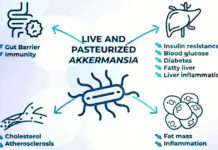Consuming dietary fiber may reduce the risk of dementia in the elderly more prone to Alzheimer’s disease. The evidence emerges from a study conducted in Italy, on a community of people housed in social welfare residences. (1)
The beneficial function of dietary fiber
Consumption of fruits, vegetables, whole grains and other sources of dietary fiber is unanimously recognized as beneficial to health. Dietary guidelines indicate in adults an optimal dietary fiber intake of 30-35 g/day for men and 25-32 g/day for women. (2)
Dietary fiber intake, along with other nutrients, was also associated with improved brain integrity, such as higher total brain volume and lower white matter hyperintensity volume in the elderly without dementia, the study authors recall.
The impact of dietary fiber on cognitive function could be mediated by its influence on the gut microbiota. Dietary fiber intake shapes the composition and/or functionality of the gut microbiota by increasing the production of fermentative end products, such as short-chain fatty acids (SCFA). These metabolites have shown the potential to modulate brain function through the ‘microbiota-gut-brain’ axis.
Dietary fiber against Alzheimer’s disease
The international team of researchers (U.S., Spanish and Italian) on these premises evaluated the relationship between dietary fiber intake and the incidence of cognitive decline in a prospective study of community-dwelling elderly, the Aging in Chianti, Aging in the Chianti Area (InCHIANTI) study.
The study involved 848 over-65s(56% females), with an average age of 71 years. For 15 years, every three years, researchers examined their diet, cognitive condition and other health parameters.
The result
In the 15 years of observation, no correlation between fiber consumption and cognitive decline emerged in general.
In the elderly with the APOE4 gene (associated with higher than average Alzheimer’s risk), on the other hand, a daily consumption of 5 grams of dietary fiber was found to be markedly associated with a 30 percent lower risk of cognitive decline.
The APOE4 gene
The APOE4 gene is recognized as an indicator of dementia risk, which, however, must be balanced with lifestyle, diet, and age. The fear of relatives of people with Alzheimer’s of contracting the same disease has fueled a business of unreliable predictive analyses.
In science, however, new reliable and noninvasive diagnostic methods are on the way. The first study on the subject is Italian. In the Interceptor project, preparatory to the application of the new diagnostics, 400 at-risk people are enrolled to predict the conversion of mild cognitive decline to Alzheimer’s dementia. (3)
The project is promoted and supported by the Ministry of Health and Aifa, the Italian Drug Agency, in collaboration with the Istituto Superiore di Sanità and Aima, the Italian Alzheimer’s Disease Association. The Agostino Gemelli IRCCS University Polyclinic Foundation coordinates and participates together with a network of 20 Italian neurological facilities.
Marta Strinati
Notes
(1) Andrea Unión-Caballero, Tomás Meroño, Cristina Andrés-Lacueva, Nicole Hidalgo-Liberona, Montserrat Rabassa, Stefania Bandinelli, Luigi Ferrucci, Massimiliano Fedecostante, Raúl Zamora-Ros, Antonio Cherubini. Apolipoprotein E gene variants shape the association between dietary fiber intake and cognitive decline risk in community-dwelling older adults. Age and Aging, Volume 52, Issue 1, January 2023, afac329, https://doi.org/10.1093/ageing/afac329
(2) Dario Dongo, Carlotta Suardi. Fiber and whole grains, long life in health. GIFT (Great Italian Food Trade). 25.1.19
(3) The Interceptor project is described on the official website https://www.interceptorproject.com/
Professional journalist since January 1995, he has worked for newspapers (Il Messaggero, Paese Sera, La Stampa) and periodicals (NumeroUno, Il Salvagente). She is the author of journalistic surveys on food, she has published the book "Reading labels to know what we eat".








